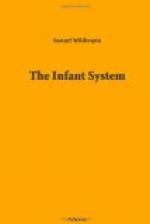Such, indeed, is the opinion of the unfitness of females for the occupation of teaching, in Scotland, that in many places the very idea of it is scouted. The people of that country have scarcely heard of a school-mistress, even for the youngest children; and certain it is, that education is much better conducted in Scotland than in most other places. If the minds of children are to be cultivated, and a firm and decided tone given to their characters, say they, what can be the use of sending them to a school conducted by a woman only? And I must candidly admit, that I perfectly agree with them on this head, and have therefore deemed it my duty to be thus explicit on the matter.[A]
[Footnote A: I am sorry to say that, at this time, the people of Scotland have been led into the same error, of which I have complained. I did hope they would never have allowed themselves to be led away from their old, judicious, and workable plans, far the sake of party, or fashion; but so it is, and it is much to be regretted: however, it is a consolation to know that it is not universal.]
One thing I must add, by way of conclusion: to render any man or woman competent to discharge the duties of the situation efficiently, the heart of the teacher must be in the school. If there be not the zeal of the amateur, the skill of the professor will be of little avail. The maxim will apply to every species of occupation, but it is peculiarly true as to that of an infant school teacher. To those who can feel no other interest than that which the profit gives to the employment, it will soon become not only irksome, but exceedingly distasteful. But certain I am that it is possible to feel it to be what it is—an employment not only most important, but likewise most interesting. It is one which a philosopher might choose for the study of the human character, and a philanthropist for its improvement.




